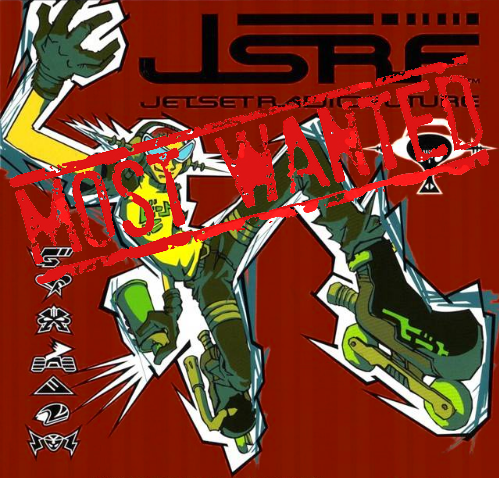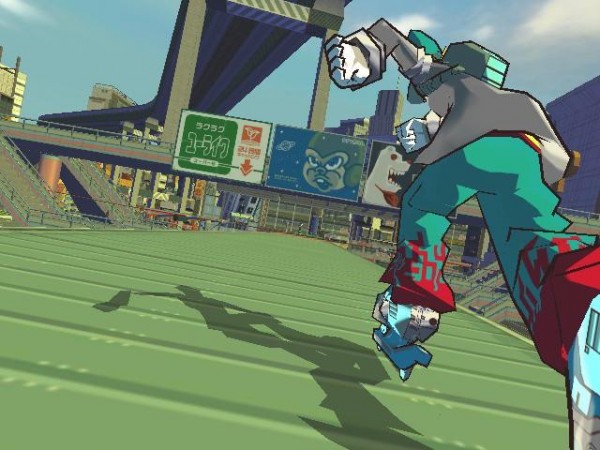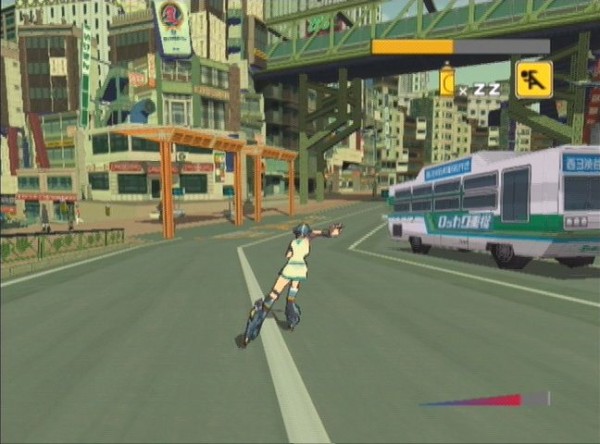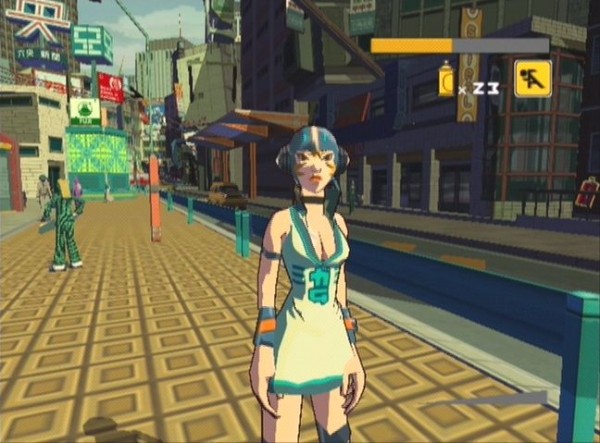XBLA’s Most Wanted: Jet Set Radio Future
Culture is everywhere, it’s in the government propaganda, in the abrasive security details, in the greyness and ubiquity of society… oh, wait, no it’s not. That is, until DJ Professor K and Jet Set Radio bring back the funk in a rude way. Strap on your roller blades and attack Japan, strike back at the oppressive government, fight the monotony, tag over the propaganda and bring back freedom and love to society in Jet Set Radio Future.
That is, if you have the original Xbox. In fact, if you do, you probably have this game or did at one point (maybe you got it combined with Sega GT 2002) as it was one of its very early releases and to this day one of the most unique. Players take on the streets of Japan with their crew of oppression-fighting freestyle rollerbladers, defeating area security, tagging the town, and dissolving violent gangs from the dark corners of Japan in an effort to bring back the freedom of expression. With plenty of different levels, challenges, hidden collectibles and a decent multiplayer Jet Set Radio Future (JSRF) was a robust title considering its rather niche gameplay style.
What should change:
Expanded multiplayer – Unfortunately there aren’t too many multiplayer modes: ball chase is incredibly fun with three other friends. Racing is a bit more conventional and kart styled, and while it’s one of the best parts of the single player and map design, doesn’t innovate much. There’s also a tagging mode which can be great fun and chaos but experienced players will get patterns down and the lack of randomness beyond the various powerups mean this mode won’t get as much love. Part of the problem was no online, and of course on XBLA that’d be resolved, which would do wonders for this game. Luckily there’s plenty to do to expand on the multiplayer universe with tons of single player challenges to score high on tricks and time trials which unlock all the enemy characters from the game.
Difficulty tweaks – While the world is initially very small and sometimes the map can be confusing, each level is introduced at a proper pace and each area usually has its own unique features, making them fun to traverse at first. Unfortunately some maps can be incredibly frustrating towards the end, and while trouncing them is rewarding and satisfying, the challenges provided by the story combined with that of the map can be a bit much for those less accustomed to platforming on wheels.
What should stay the same:
The setting – The strange and abstract story holds together pretty well throughout, telling the tale of your street crew, the GGs, and their endless endeavor to bring down the insane mayor. In and out of his employ are plenty of baddies, from the average security cop to the Most Wanted gang with whom the player will have many encounters. DJ Professor K’s narration is welcome when it shows up as he’s careful not to beat you over the head with instructions, though he will laugh derisively when you fall off buildings (as he should).
Challenges/side missions – As any good open world game should be, JSRF is full of a variety of challenges. Rivals can be found, challenged and acquired for your crew by searching them out and beating them in races, or sometimes enemy gangs will challenge you to a race right out. Another big part of JSRF is tagging graffiti on walls in each area, or having more focused missions around tagging, and in fact that’s how combat works for the most part. The mechanic isn’t flawless, and it’s most certainly not the star of this show, but it gets the job done. A great bit of the game involves the multiplayer gametype which features a team versus team environment and a ball which must be held on to for a lap to attain victory. The game clocks in at about eight hours depending on how much time is spent trying to perfect each map.
Joining the cause – Beyond all the gameplay and the presentation (featuring a nice, vibrant cel shaded Japan) an important mention is the message of this game. It’s all about the counter culture surfacing from the underground and showing a tired and drained Japan that there’s still love and spontaneity out there to brighten the world. Players in JSRF endeavor to break down social conventions and stop the government from controlling and minimalizing all of the greatness any group of people can command. It might not affect gameplay, but delivering that sense of empowerment to the player and allowing them to carry a message with them is all the immersion a player could ask for in this sort of game.
Why it would succeed:
Sega hasn’t forgotten about this game as Beat (the main character from Jet Grind Radio, one of the game’s earlier iterations who also is featured in JSRF) and Gum continue to show up in Sega’s All-Star games. JSRF clocks in at close to 2 GB, roughly the limit set for XBLA. Why not add a bit of file compression and simply add online play to the multiplayer? People love when a game isn’t a heavy download, and they love taking things online. The game’s cel shading keeps the graphical demands low as well, so all that’s necessary is a bit of ant-aliasing. Above all, Jet Set Radio Future would be right at home with some of the crazy ideas indie XBLA developers come up with.
Do you understand, understand, the concept of love?





